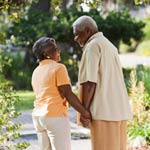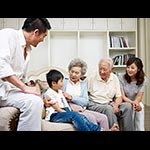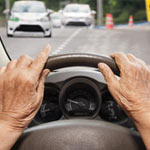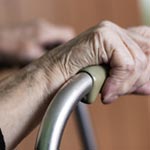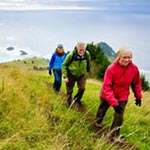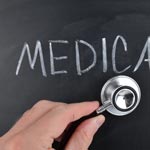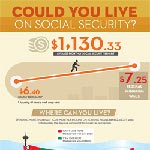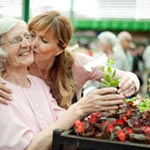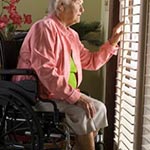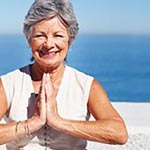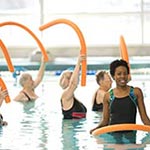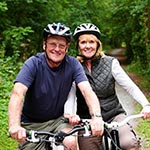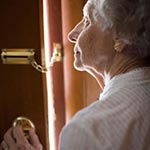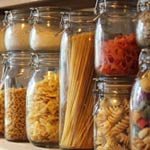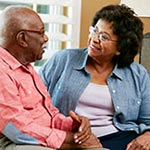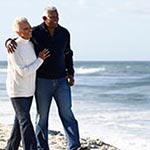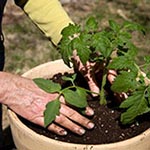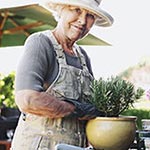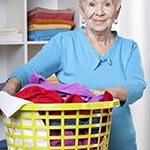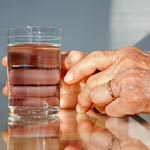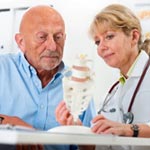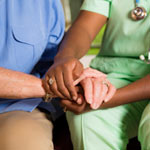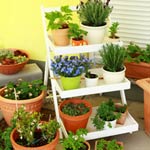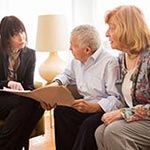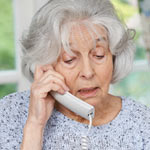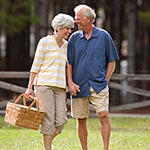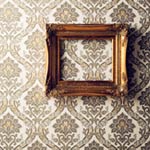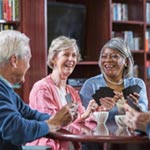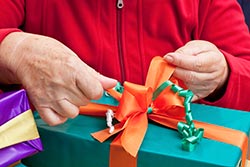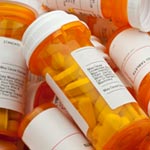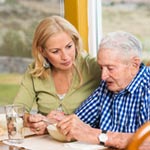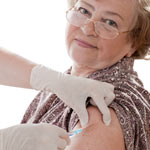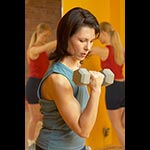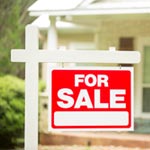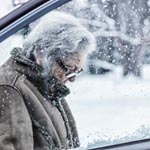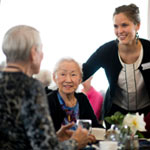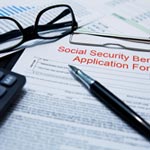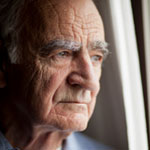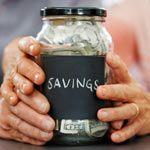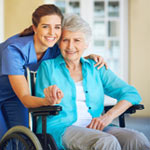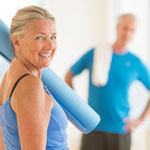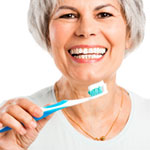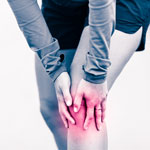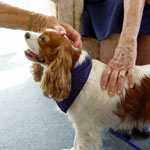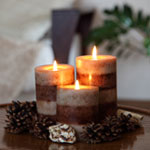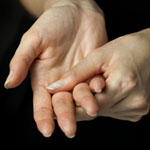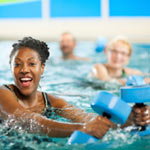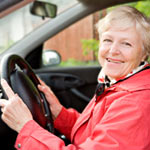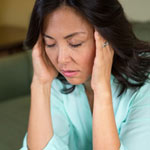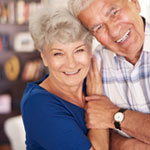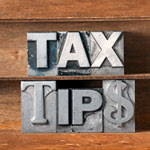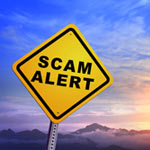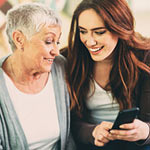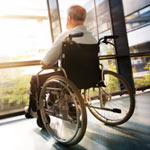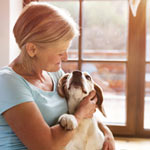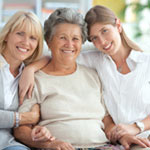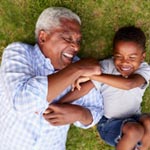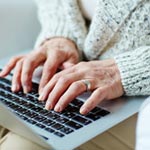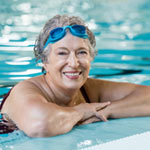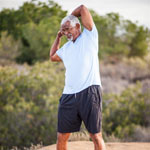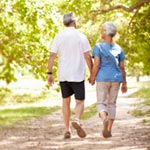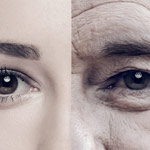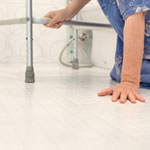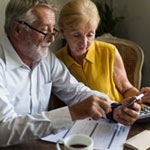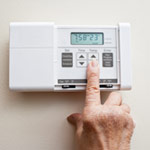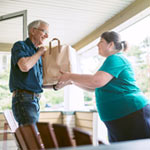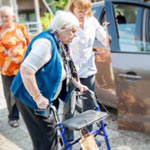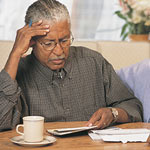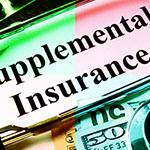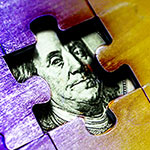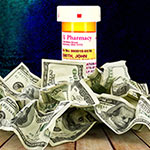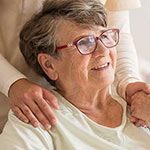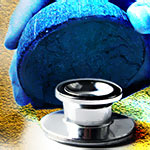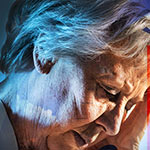Home Safety Checklist for Single Seniors

By Lucille Reed •
September 12, 2012
Living alone has certain advantages, but one definite disadvantage is that in the case of an accident or other emergency, you’re on your own until help can arrive. If you or someone you know is a single senior living alone, then there are some things you can do to make that home a safer place. Be prepared in case of emergencies. Use the following home safety checklist for single seniors and avoid unnecessary accidents.
- Working Smoke Detectors
Be sure there are smoke detectors installed on each level of your home. Run regular tests to ensure they are working properly. Replace batteries when the need arises. - Carbon Monoxide Detectors
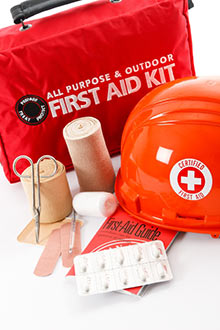 Carbon monoxide is called the "silent killer." That’s because this deadly gas has no smell, color, or taste. Humans can’t detect it. If you don’t know it’s there, you can’t protect yourself from it. Carbon monoxide detectors detect the gas and sound an alarm before it becomes a fatal issue. If you don’t already have one, take the time to install one in your home.
Carbon monoxide is called the "silent killer." That’s because this deadly gas has no smell, color, or taste. Humans can’t detect it. If you don’t know it’s there, you can’t protect yourself from it. Carbon monoxide detectors detect the gas and sound an alarm before it becomes a fatal issue. If you don’t already have one, take the time to install one in your home. - Home Security System
A home security system is an important part of home safety, especially if you live alone. Prices range from free (with a contract and monthly monitoring system) to thousands of dollars. You can also get home security devices like door and window alarms at your local hardware store. These items can be bought individually or in packages. Do your research and get what fits your needs and your budget, but get something. - First Aid Kit
You can buy a pre-packaged first aid kit or build it yourself. Be sure to include basic items like bandages, anti-septic wipes, gauze pads, medical tape, and eye flushing solution, tweezers, and sterile gloves. In addition, items like chemical ice packs, scissors, and cotton balls should be handy. Don’t forget to customize your first aid kit to meet your specific health needs too. Include medications, syringes, or diabetes-specific items—whatever you might need on hand fast in the case of an emergency. - Safe Bathrooms
One slip and fall in the shower or tub could result in serious injury or worse. Use non-skid mats on all slippery surfaces in the bathroom. Make sure the thermometer on the hot water heater reads below 120 degrees. It’s also not a bad idea to install grab bars in the shower for added safety. - Safe Steps
Make sure that all steps and staircases in your house are safe. This includes exterior steps. Install handrails and make sure they are maintained to safety standards. Make sure all steps and stairs are well lit. Don’t put loose rugs on or near steps. Always hold the handrail when walking up or down. - Safely Stored Hazardous Materials
Ensure all hazardous chemicals and other materials in your home are stored safely. Keep flammable items away from ignition sources. Store harmful chemicals in a place away from food items and where visitors, children, and pets cannot reach. Read labels and don’t store materials near items that could make them explode or turn hazardous. - Check Cords
Check all cords in your home to make sure they’re in good condition. Replace any with frays or cracks. Don’t plug more than one item into an extension cord. Make sure cords aren’t out where they can trip you. An electrical cord that’s nailed to the wall is a big no-no. - Check Flooring
Be sure all flooring is slip and trip free. Use slip-resistant rugs and runners. Don’t place rugs in areas that cause bumps beneath them. Do place them in areas with slippery flooring. Discard rugs and mats that are frayed to the point that they may cause falls. - Keep Heating and Cooling Units Safe
Have your heating and ac unit checked regularly. Change or have someone else change your filters regularly. Make sure space heaters are stable and are kept away from flammable materials. If you have a fireplace, be sure it’s clear of debris before using. Schedule routine cleanings, how often will depend on how much you use it. Always use a fireplace screen. Make certain the fire is completely out before you leave the area or go to sleep.
You might also be interested in...
-
 4 Important Safety Measures For Seniors
4 Important Safety Measures For Seniors
-
 5 Scams Seniors Should Watch Out For
5 Scams Seniors Should Watch Out For
-
 5 Telltale Signs It’s Time To Stop Driving
5 Telltale Signs It’s Time To Stop Driving
-
 6 Sports Seniors Can Enjoy
6 Sports Seniors Can Enjoy
-
 7 Ways To Feel Younger
7 Ways To Feel Younger
-
 Aging In America
Aging In America
-
 The Best Low Maintenance Pets For Seniors
The Best Low Maintenance Pets For Seniors
-
 Budget-Friendly Vacations with Perks for Seniors
Budget-Friendly Vacations with Perks for Seniors
-
 Can Eating Cherries Alleviate Arthritis?
Can Eating Cherries Alleviate Arthritis?
-
 How To Choose A Medicare Supplement Plan
How To Choose A Medicare Supplement Plan
-
 Could You Live On Social Security?
Could You Live On Social Security?
-
 Does Your Elderly Loved One Need More Care than You Can Give
Does Your Elderly Loved One Need More Care than You Can Give
-
 Is Your Elderly Parent Feeling Lonely
Is Your Elderly Parent Feeling Lonely
-
 Five Health Tips for Men over 50
Five Health Tips for Men over 50
-
 Five Health Tips for Women over 50
Five Health Tips for Women over 50
-
 Five Tips for Helping Seniors Stay Active
Five Tips for Helping Seniors Stay Active
-
 Helpful Tips for Adjusting to an Empty Nest
Helpful Tips for Adjusting to an Empty Nest
-
 Home Safety Checklist for Single Seniors
Home Safety Checklist for Single Seniors
-
 Home Safety Tips for Seniors Living Alone
Home Safety Tips for Seniors Living Alone
-
 How Seniors Can Improve Their Posture
How Seniors Can Improve Their Posture
-
 How Seniors Should Stock Their Kitchen
How Seniors Should Stock Their Kitchen
-
 How to Be a Good Husband in Retirement
How to Be a Good Husband in Retirement
-
 How to Change Your Life in 10 Days
How to Change Your Life in 10 Days
-
 How to Do Container Gardening for Seniors
How to Do Container Gardening for Seniors
-
 How to Find Happiness in Your Senior Years
How to Find Happiness in Your Senior Years
-
 How to Grow Easy Houseplants for Seniors
How to Grow Easy Houseplants for Seniors
-
 How To Help Your Senior Parent Stay Mentally Healthy and Happy
How To Help Your Senior Parent Stay Mentally Healthy and Happy
-
 How to Simplify Housekeeping for Seniors
How to Simplify Housekeeping for Seniors
-
 How to Stay Looking Sharp for Senior Men
How to Stay Looking Sharp for Senior Men
-
 The Importance Of Keeping Seniors Hydrated
The Importance Of Keeping Seniors Hydrated
-
 Is Chiropractic Care Safe For Seniors?
Is Chiropractic Care Safe For Seniors?
-
 Is Long-Term Care Insurance Necessary
Is Long-Term Care Insurance Necessary
-
 Patio Gardening For Seniors
Patio Gardening For Seniors
-
 Preparing For Retirement
Preparing For Retirement
-
 Pros and Cons of Living in a Retirement Community
Pros and Cons of Living in a Retirement Community
-
 How To Protect Seniors Against Identity Theft
How To Protect Seniors Against Identity Theft
-
 Senior Life Insurance Pays for Funeral Costs
Senior Life Insurance Pays for Funeral Costs
-
 Senior Summer Safety
Senior Summer Safety
-
 How Seniors Benefit From Adopting Senior Pets
How Seniors Benefit From Adopting Senior Pets
-
 How Seniors Can Decorate With Unique Framed Art
How Seniors Can Decorate With Unique Framed Art
-
 Seniors & The Social Life
Seniors & The Social Life
-
 Seven Power Foods for Seniors
Seven Power Foods for Seniors
-
 Tips for Seniors: How to Upgrade Your Bed for a Better Night's Sleep
Tips for Seniors: How to Upgrade Your Bed for a Better Night's Sleep
-
 Tips For Seniors On Improving Your Immune System
Tips For Seniors On Improving Your Immune System
-
 Tips for Seniors on How to Stock a Gift Drawer
Tips for Seniors on How to Stock a Gift Drawer
-
 Top Travel Safety Tips for Seniors
Top Travel Safety Tips for Seniors
-
 Understanding Medicare Part D Plans
Understanding Medicare Part D Plans
-
 Reasons Why An Elderly Loved One May Not Be Eating
Reasons Why An Elderly Loved One May Not Be Eating
-
 Why Seniors Need The Flu And Pneumonia Vaccines
Why Seniors Need The Flu And Pneumonia Vaccines
-
 You Won't Believe How Easily You Can Stall Aging
You Won't Believe How Easily You Can Stall Aging
-
 How To Choose Low Income Housing For Seniors
How To Choose Low Income Housing For Seniors
-
 8 Unique Gifts For Seniors
8 Unique Gifts For Seniors
-
 Activities For Senior Citizens
Activities For Senior Citizens
-
 7 Winter Safety Tips For Seniors
7 Winter Safety Tips For Seniors
-
 5 Questions To Ask When Considering A Continuing Care Retirement Community
5 Questions To Ask When Considering A Continuing Care Retirement Community
-
 How Long Should You Wait To Claim Social Security
How Long Should You Wait To Claim Social Security
-
 Signs And Symptoms Of A UTI In Seniors
Signs And Symptoms Of A UTI In Seniors
-
 How To Deal With The Emotions Of Retirement
How To Deal With The Emotions Of Retirement
-
 How To Help Seniors Fight Depression
How To Help Seniors Fight Depression
-
 How Seniors Can Save More Money
How Seniors Can Save More Money
-
 What Services To Expect From Assisted Living Centers
What Services To Expect From Assisted Living Centers
-
 How To Live A Long Life
How To Live A Long Life
-
 Top 3 Dental Risks For Seniors
Top 3 Dental Risks For Seniors
-
 Choosing The Right Assisted Living Facility
Choosing The Right Assisted Living Facility
-
 Different Ways To Ease Knee Pain
Different Ways To Ease Knee Pain
-
 Why Assisted Living Centers Allow Pets
Why Assisted Living Centers Allow Pets
-
 4 Surprising Health Hazards You May Have In Your Home
4 Surprising Health Hazards You May Have In Your Home
-
 5 Mental Exercises To Increase Happiness
5 Mental Exercises To Increase Happiness
-
 Why Seniors And Caregivers Need To Laugh More
Why Seniors And Caregivers Need To Laugh More
-
 How To Reverse The Effects Of Arthritis
How To Reverse The Effects Of Arthritis
-
 6 Exercises That Won’t Hurt Your Joints
6 Exercises That Won’t Hurt Your Joints
-
 Driving Safety Tips For Seniors
Driving Safety Tips For Seniors
-
 4 Natural Ways To Combat Feeling Dizzy
4 Natural Ways To Combat Feeling Dizzy
-
 Senior Life Insurance is a Worthwhile Investment
Senior Life Insurance is a Worthwhile Investment
-
 Tax Breaks Every Senior Should Know
Tax Breaks Every Senior Should Know
-
 How To Make Money During Retirement
How To Make Money During Retirement
-
 5 Phone Scams Targeting Seniors Now
5 Phone Scams Targeting Seniors Now
-
 How Technology Can Keep Seniors Safe
How Technology Can Keep Seniors Safe
-
 How To Not Go Wrong When Choosing A Nursing Home
How To Not Go Wrong When Choosing A Nursing Home
-
 Disaster Checklist For Seniors
Disaster Checklist For Seniors
-
 How Visiting Seniors Often Can Keep Them Healthier
How Visiting Seniors Often Can Keep Them Healthier
-
 How To Make A Senior’s Day
How To Make A Senior’s Day
-
 Internet Safety Tips Every Senior Should Know
Internet Safety Tips Every Senior Should Know
-
 5 Ways To Strengthen Aging Bones And Muscles
5 Ways To Strengthen Aging Bones And Muscles
-
 How Senior Yoga Can Be A Lifesaver
How Senior Yoga Can Be A Lifesaver
-
 Live Longer By Volunteering
Live Longer By Volunteering
-
 Managing Pain For Seniors
Managing Pain For Seniors
-
 6 Everyday Ways For Seniors To Stay Active
6 Everyday Ways For Seniors To Stay Active
-
 Bad Habits That Make You Age Faster
Bad Habits That Make You Age Faster
-
 Fall Prevention For Seniors
Fall Prevention For Seniors
-
 6 Ways For Seniors To Budget For Life Insurance
6 Ways For Seniors To Budget For Life Insurance
-
 Summertime Resources For Seniors & Caregivers
Summertime Resources For Seniors & Caregivers
-
 5 Simple Ways Seniors Can Get Free Help
5 Simple Ways Seniors Can Get Free Help
-
 Navigating Ride Programs for Seniors
Navigating Ride Programs for Seniors
-
 What’s Preventing You from Receiving Medicare Supplemental Insurance?
What’s Preventing You from Receiving Medicare Supplemental Insurance?
-
 Can You Outlive Your Life Insurance?
Can You Outlive Your Life Insurance?
-
 Medicare Part B Plus Medigap vs a Medicare Advantage Plan: Which is better?
Medicare Part B Plus Medigap vs a Medicare Advantage Plan: Which is better?
-
 3 Things to Know about Senior Life Insurance
3 Things to Know about Senior Life Insurance
-
 Do Medicare Supplement Plans Cover Pre-existing Conditions
Do Medicare Supplement Plans Cover Pre-existing Conditions
-
 What is Final Expense Insurance and Who Should Buy It?
What is Final Expense Insurance and Who Should Buy It?
-
 Does Medicare Pay for Prescriptions?
Does Medicare Pay for Prescriptions?
-
 Advocating for a Hospitalized Parent or Grandparent
Advocating for a Hospitalized Parent or Grandparent
-
 How Do You Choose the Best Medicare Coverage?
How Do You Choose the Best Medicare Coverage?
-
 Key Signs it’s Time to Get In-Home Care or Move to an Assisted Living Facility
Key Signs it’s Time to Get In-Home Care or Move to an Assisted Living Facility

 Insurance products are available in New York from
Insurance products are available in New York from  Insurance products are available in your state from
Insurance products are available in your state from 





